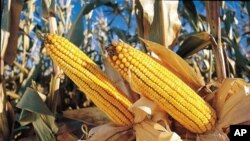Kenya is now allowing the production and importation of genetically modified foods. On July 1, a new law took effect making it the fourth African country to allow the crops. The others are South Africa, Egypt and Burkina Faso.
Supporters of the law say genetically modified foods will help Kenya deal with chronic grain shortages. In the United States, federal officials say they are safe to eat, but others are opposed to them.
The crops are also known as GMO, or genetically modified, organisms, or simply GM, for genetically modified.
Dr. Vandana Shiva, director of Navdanya, a research foundation based in New Delhi, India, has long been an opponent of GM foods.
“I have been monitoring this issue since it became an issue. And Africa has been a leader in bio-safety. Africa, 10 years, 15 years ago, was showing that you don’t need GMOs. The fact that Kenya has opened its doors to GMOs is part of the pressure that’s building up with big money…. It’s not really a democratic decision, which is why you’re seeing protests in Kenya,” she said.
The new law states that approval of Kenya’s National Safety Authority is needed before GM business can be conducted.
Grain shortfalls
Shiva disagrees with those who say the modified crops are needed because Kenya faces a chronic grain shortfall.
“GMOs definitely don’t overcome grain shortages. The technology doesn’t allow an increase in yield. So far, all it’s done is introduce two kinds of toxic genes into plants. One, herbicide resistance, which is failing to control weeds in the U.S…and Bt toxin gene, which is also not able to control pests. We have an emergence of resistance in the bollworm in India,” she said.
Safety
The U.S.has said GM foods are safe to eat. Monsanto, a major producer of genetically modified crops, also said the foods are “safe to eat.”
“Hundreds of millions of meals containing food from GM crops have been consumed and that there has not been a single substantiated instance of illness or harm associated with GM crops,” said Montsanto.
Shiva once again disagrees. She said, “There are safety issues. The U.S. has never ever done serious trials independent of the company’s. Unfortunately, in 1992 the United States introduced the principle of ‘substantial equivalence,’ which said treat a genetically modified food as if it is a normal food. And therefore, it is a ‘don’t see, don’t look and assume safety’ policy.”
On its website, Monsanto states, “Substantial equivalence is a useful concept which is accepted and utilized by most regulatory agencies worldwide, including the Canadian Food Inspection Agency, the Japanese Ministry of Health and welfare, the United Nations Food and Agriculture Organization and the Organization for Economic Cooperation and Development. However, substantial equivalence is NOT the end of the assessment process--we still have to address anything that is new or different.”
Shiva describes the U.S. as being “backward” in bio-safety testing. She added that independent testing done in Europe was “attacked by the industry” when safety issues were raised.
“Organs are getting affected. Immunity is getting affected,” she said.
Monsanto produces a variety of GM crops. It said, “All of these crops have been assessed for food and feed safety in producing countries, and many more countries have approved the import of food or food ingredients that contain GM products.”
Organic farming
Shiva and her foundation promote organic farming to solve food security problems. But can organic farming cover Kenya’s food needs, considering the country is in the midst of a serious and prolonged drought?
“The only way to deal with drought is through organic farming because drought means scarcity of water. That means you must have more moisture available in your soil to be able to produce food,” she said. “The only way you can increase soil moisture is through increasing organic matter. Our research in India shows that we can have as much as a 25 percent increase in organic matter by recycling plant residues, organic manure and doing composting.”
She said this technique not only creates drought resilience but also increases food production.
Our work in India,” said Shiva, “shows that we can double food production in India if we adopt ecological methods. The United Nations, based on African studies…put out a report showing that ecological methods are…doubling production in Africa. That data cannot be ignored anymore. Kenya can feed itself. Africa can feed itself. The world can feed itself through organic matter.”
Cost
In the United States, organic food often costs more than non-organic food.
“The higher prices that are prevailing in the world across the board on food are because of speculation. As far as organic being costly is concerned, in the supermarkets, yes, but not in the farmers’ market. And therefore what we need to do to make organic accessible is to create decentralized distribution systems where there are direct links between the farmers and the eaters,” she said.
Shiva said this has been done in Brazil with great success.
“It’s not organic that’s costly,’ she said. “It’s organic distribution that becomes costly because it has no support, no subsidies of the kind that chemical food. Food controlled by agribusiness gets $400 billion of subsidies in the rich countries.”
Shiva said other countries may follow Kenya in allowing GM foods because of the heavy marketing by Monsanto.
Groups opposed to genetically modified foods plan to release a new report on the matter on World Food Day, October 16.




